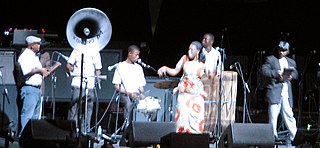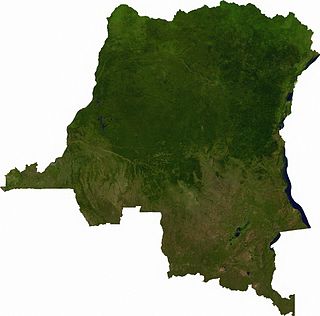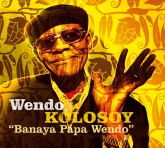Congolese music is one of the most influential music forms of the African continent since the 1930s. Congolese musicians had a huge impact on the African musical scene and outside. Many contemporary genres of music were created or heavily influenced by Congolese music. As the genre of music in Kenya Benga or in Colombia Champeta. Democratic Republic of Congo and are contemporary hubs of African music since the 1930s. Congolese rumba joined in 2021, other living traditions such as Jamaican reggae music and Cuban rumba on Unesco's "intangible cultural heritage of humanity" list. Music of the Democratic Republic of the Congo varies in its different forms. Outside Africa, most music from the Democratic Republic of Congo is called Soukous, which most accurately refers instead to a dance popular in the late 1960s. The term rumba or rock-rumba is also used generically to refer to Congolese music, though neither is precise nor accurately descriptive.

Taraful Haiducilor are a Romanian-Romani taraf from Clejani, Romania, and one of the most prominent such groups in post-Communist era Romania. In the Western world they have become known by the name given to them in French-speaking areas, where they are known as Taraf de Haïdouks.
Soukous is a genre of dance music from Congo-Kinshasa and Congo-Brazzaville. It derived from Congolese rumba in the 1960s, becoming known for its fast dance rhythms and intricate guitar improvisation, and gained popularity in the 1980s in France. Although often used by journalists as a synonym for Congolese rumba, both the music and dance associated with soukous differ from more traditional rumba, especially in its higher tempo and longer dance sequences. Notable performers of the genre include Franco Luambo, Papa Wemba, Sam Mangwana, Tabu Ley Rochereau, and Pépé Kallé.

Jules Shungu Wembadio Pene Kikumba, known professionally as Papa Wemba, was a Congolese singer and musician who played Congolese rumba, soukous, and ndombolo. Dubbed the "King of Rumba Rock", he was one of the most popular musicians of his time in Africa and played an important role in world music. He was also a fashion icon who popularized the Sape look and style through his musical group Viva la Musica, with whom he performed on stages throughout the world.
Crammed Discs is an independent record label whose output blends world music, rock, pop, and electronica. Based in Brussels, Belgium, Crammed was founded in 1980 by Marc Hollander of Aksak Maboul and has since released around 375 albums and 275 singles, working with artists from all over the world.
Aksak Maboul are a Belgian avant-rock band founded in 1977 by Marc Hollander with Vincent Kenis, and now revolving around Hollander and Véronique Vincent. Aksak Maboul hasn't stopped changing shape and form throughout its existence, exploring diverse musical styles with their own aesthetic approach.

Pascal-Emmanuel Sinamoyi Tabu, better known as Tabu Ley Rochereau, was a leading African rumba singer-songwriter from the Democratic Republic of the Congo. He was the leader of Orchestre Afrisa International, as well as one of Africa's most influential vocalists and prolific songwriters. Along with guitarist Dr Nico Kasanda, Tabu Ley pioneered soukous and internationalised his music by fusing elements of Congolese folk music with Cuban, Caribbean and Latin American rumba. He has been described as "the Congolese personality who, along with Mobutu, marked Africa's 20th century history." He was dubbed "the African Elvis" by the Los Angeles Times. After the fall of the Mobutu regime, Tabu Ley also pursued a political career. His musical career ran parallel to the other great Congolese rhumba bandleader and rival Franco Luambo Makiadi who ran the band TPOK Jazz throughout the 1960s, 1970s and '80s.

Nicolas Kasanda wa Mikalay, popularly known as Docteur Nico, was a guitarist, composer and one of the pioneers of Congolese music. He was born in Mikalayi in the Belgian Congo. He graduated in 1957 as a technical teacher, but inspired by his musical family, he took up the guitar and in time became a virtuoso soloist.

Konono Nº1 is a musical group from Kinshasa, Democratic Republic of the Congo. They are known for their DIY aesthetic, combining electric likembé with vocals, dancers, and percussion instruments that are made out of items salvaged from a junkyard. The group's amplification equipment is equally rudimentary, including a microphone carved out of wood fitted with a magnet from an automobile alternator and a gigantic horn-shaped amplifier. The genre of the band's music has been characterized as difficult to classify; the group themselves have classified their music under the labels of "tradi-modern" and "Congotronics".
Congolese rumba is a popular genre of dance music that originated in the Congo basin during the 1940s, deriving from Cuban son. The style gained popularity throughout Africa during the 1960s and 1970s.
Zoran Janjetov is a Serbian comics artist. Janjetov is among most prominent comics creators of former Yugoslavia, published worldwide. He is best known as the illustrator of Avant l'Incal and The Technopriests, written by Alejandro Jodorowsky.

Congotronics is the official debut album by Konono Nº1. It was released in 2004. by Crammed Discs. It has won the band massive favour in the dance and alternative rock scenes as well as in world music circles and in the North American and European media.

Hector Zazou was a prolific French composer and record producer who worked with, produced, and collaborated with an international array of recording artists. He worked on his own and other artists' albums, including Sandy Dillon, Mimi Goese, Barbara Gogan, Sevara Nazarkhan, Carlos Núñez, Italian group PGR, Anne Grete Preus, Laurence Revey, and Sainkho since 1976.

Articles related to the Democratic Republic of the Congo include:
Marc Hollander is a Belgian musician, producer and creator of the independent record label, Crammed Discs.
The Honeymoon Killers were a Belgian experimental rock band originally formed in 1974 by Yvon Vromman, with J.F Jones Jacob, and Gérald Fenerberg. In its first incarnation, the band played mostly in Brussels, was arrogant and funny, and performed massacres on all musical genres, from rockabilly and punk to marching band music, French chanson and free jazz.

Antoine Wendo Kolosoy, known as Papa Wendo, was a Congolese musician. He is considered the "Father" of Congolese rumba, also known as soukous, a musical style blending son cubano, beguine, waltz, tango and cha-cha.

Staff Benda Bilili are a group of street musicians in the Democratic Republic of the Congo. They used to live around the grounds of the zoo in the country's capital city, Kinshasa, and play music which is rooted in soukous, with elements of old-school rhythm and blues and reggae. The core of the band consists of four senior singers/guitarists, who are paraplegic and move around in spectacularly customized tricycles. They are backed by a younger rhythm section consisting of abandoned street children who were taken under the protection of the older members of the band. The soloist is an 18-year-old boy (2009) who plays guitar-like solos on an electrified one-stringed lute he designed and built himself out of a tin can. The group's name translates roughly from Lingala as "look beyond appearances".
Kasai Allstars are a 25-piece musical collective based in Kinshasa, Democratic Republic of the Congo. The musicians originally come from the Kasai region, but originating from five different ethnic groups: the Songye, Lulua, Tetela, Luba, and Luntu. Some of these groups have endured conflicting relationships over the centuries, and they each have their own culture, their own language, and their own musical traditions. These were always thought to be incompatible until the musicians decided to pool their resources and form a collective at the instigation of Belgian producer Vincent Kenis.

Assume Crash Position is the second album by the Congolese musical group Konono Nº1, and the fourth volume in the group's Congotronics series, released by Crammed Discs.










